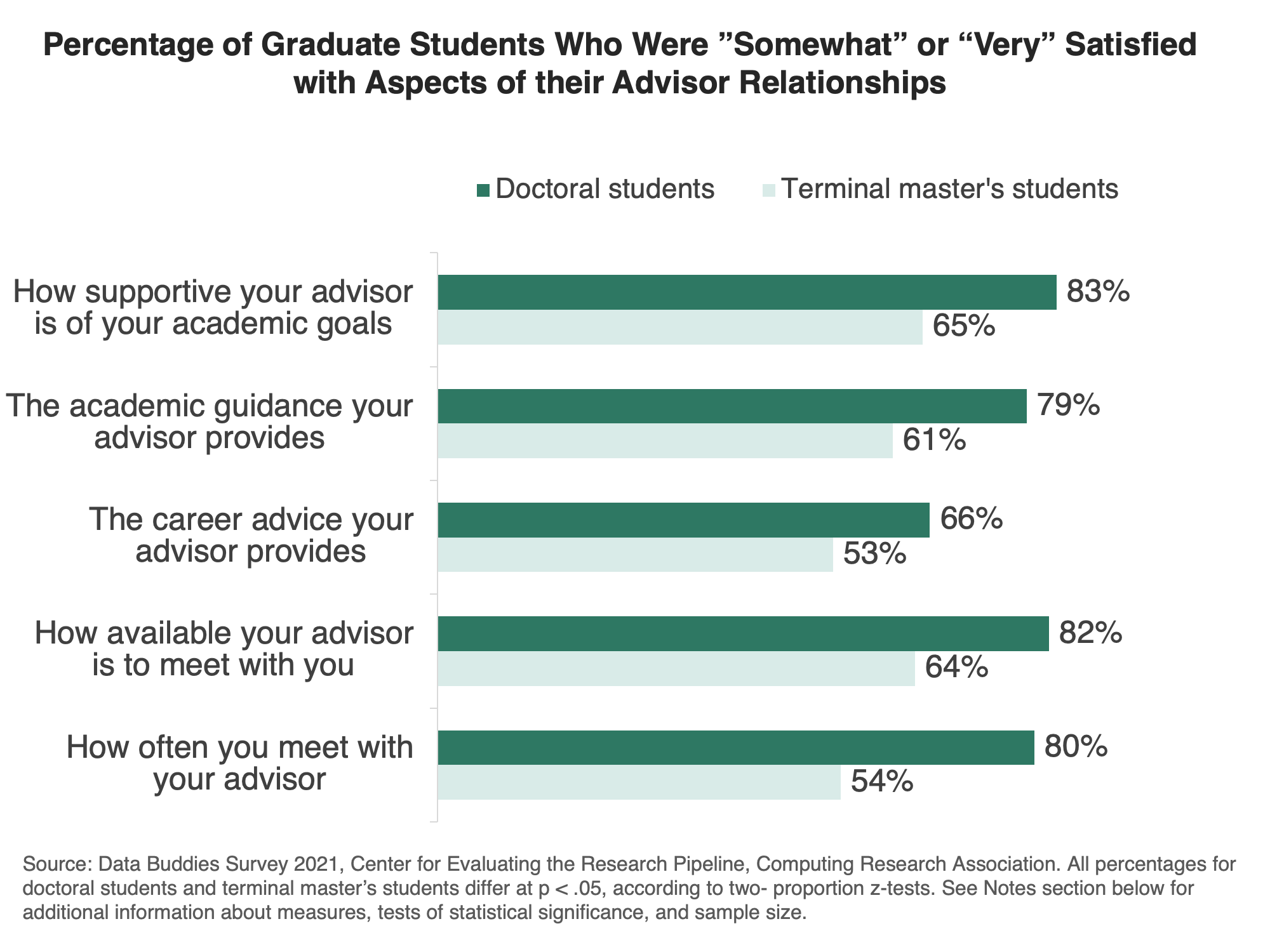Doctoral Students Are More Satisfied with Their Advisor Relationships than Terminal Master’s Students Are

Strong advisory support is a key component of positive and productive graduate school experiences. To what extent are graduate students satisfied with different aspects of their advisor relationships, and does this differ for students in terminal master’s programs and doctoral programs?
The figure above shows terminal master’s and doctoral students’ satisfaction with their advisors across five advisory domains; percentages designate those students who indicated they were “somewhat” or “very” satisfied with their advisor. As the figure shows, compared to terminal master’s students, a significantly larger percentage of doctoral students were satisfied with their advisors’ academic guidance and career advice, their support for students’ academic goals, their meeting availability, and students’ frequency of meeting with their advisors.
Generally, the doctoral students reported high levels of satisfaction, with about eight in ten students indicating that they were satisfied across four of the five measured domains. For one domain – career advice – the percentage of doctoral students who were satisfied was notably lower than the other domains, with about two-thirds of doctoral students indicating they were “somewhat” or “very” satisfied with the advice they receive in this area.
Among terminal master’s students, the largest percentage of students were satisfied with their advisors’ support for their academic goals and their availability to meet (65% and 64%, respectively). Similar to doctoral students, they were least likely to be satisfied with the career advice provided by their advisor (along with how often they met with their advisor).
Taken together, these results suggest a few potential areas for future exploration and targeted action. Further investigations should attempt to (1) identify why master’s students are less likely to have satisfying relationships with their advisors than doctoral students do and (2) work to address these gaps in the advisory relationship for master’s students. In addition, results point to a need for a greater understanding of all graduate students’ advisory needs related to career advising so that advisors can better support them in this area.
Notes:
The survey data analyzed for this infographic were collected by Center for Evaluating the Research Pipeline via The Data Buddies Project (2021). Graduate students who indicated they had an academic advisor were asked: “How dissatisfied or satisfied are you with the following?”, followed by the five items shown in the chart. Responses options for each item were “Very dissatisfied,” “Somewhat dissatisfied,” “Neither dissatisfied nor satisfied,” “Somewhat satisfied,” or “Very satisfied.” Percentages designate the subset of the total responses that were “Somewhat satisfied” or “Very satisfied.” N = 1,426 – 1,497 for terminal master’s students; N = 1,170 – 1,188 for doctoral students. All comparisons were statistically significant according to z-tests of two proportions.
 This analysis is brought to you by the CRA’s Center for Evaluating the Research Pipeline (CERP). CERP provides social science research and comparative evaluation for the computing community. Subscribe to the CERP newsletter here. Volunteer for Data Buddies by signing up here.
This analysis is brought to you by the CRA’s Center for Evaluating the Research Pipeline (CERP). CERP provides social science research and comparative evaluation for the computing community. Subscribe to the CERP newsletter here. Volunteer for Data Buddies by signing up here.
The Data Buddies Project is currently supported through National Science Foundation (NSF) awards CNS-1840724, CNS-2036717, DUE-1821136, sub-awards and contracts, and direct CRA contributions. Previous NSF awards that supported DBS include CNS-1246649 and DUE-1431112. Any opinions, findings, and conclusions or recommendations expressed in this material are those of the author(s) and do not necessarily reflect the views of the National Science Foundation.









